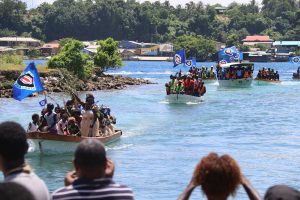Leaders of the autonomous region of Bougainville and the government of Papua New Guinea have agreed to determine a “political settlement” between them by no later than 2027.
An independence referendum in Bougainville in 2019 saw 98 percent of voters favor independence from Papua New Guinea, but the referendum doesn’t guarantee independence.
First, both parties need to adhere to the processes agreed upon in the Bougainville Peace Agreement.
“There are three main stages of engagement between the governments of Papua New Guinea and Bougainville following the referendum,” said Anthony Regan, a constitutional law expert at the Australian National University, who has advised the government in Bougainville.
“The first stage is consultation over the outcomes of the referendum. Once the consultation stage is complete, the outcome of the referendum is to be considered by the Parliament as the final decision-making authority, but the third stage is if there are any difference between the governments over any aspect of the referendum [they will] be referred to a dispute resolution process, such as the Supreme Court,” he said.
PNG Prime Minister James Marape expressed concerns at a previous consultation in May about Bougainville’s capacity to manage independence and that it could set a precedent for other parts of PNG to secede, leading to the dissolution of the country.
But Marape and Bougainville President Ishmael Toroam said in a joint statement following the second consultation earlier this month that they have agreed to a political settlement “no earlier than 2025 and no later than 2027.”
Both parties also agreed to a timetable for many powers to be transferred to the Bougainville government by 2023, with the rest to follow by 2027.
Bougainville is pushing hard for the goal of early independence, launching late last year an “independence-ready” program, which follows the earlier successes of its “referendum-ready” campaign between 2016 and 2019. The program involves constituency-based awareness campaigns on independence across the region.
But none of this guarantees independence. As it stands, Bougainville and PNG still don’t see eye to eye on how the outcome will be determined.
The Bougainville government believes Parliament is limited to ratification of either the actual results of the referendum or the outcome of the post-referendum consultations. The PNG side, however, states that Parliament is the ultimate decision-making authority, and is in no way bound by either the referendum outcomes or the outcomes of the post-referendum consultations.
“There is a serious difference here, which could cause significant problems between the governments in due course,” said Regan.
Marape said at the first consultation that the discussion of independence goes toward “testing the total sovereignty of our nationhood.”
“This is no longer just about Bougainville and the National Government. It is now about Bougainville, the National Government, and the rest of Papua New Guinea. The rest of Papua New Guinea must be on board when the final vote is taken in Parliament.”
Regan said that even if Parliament remains hesitant to hand power over to Bougainville, it will struggle to justify rejecting the near unanimous vote.
“It will be difficult to reject a demand for independence when a constitutionally mandated referendum, which was free and fair, resulted in an almost unanimous position of agreement, the demand for independence,” he said. “How else can PNG respond to a very strongly held democratic decision?”
Ezekiel Boisen, from Bougainville, fears that if independence is not achieved, violence will return to Bougainville.
“We’ve already seen years of violence here in trying to achieve independence,” he said. “If it is not achieved, who knows if the violence will return.”
For more than a decade, between 1988 to 1998, conflict raged on Bougainville between the Papua New Guinea Defense Force and the Bougainville Revolutionary Army and the Bougainville Resistance Forces. An estimated 20,000 people died as a result of the conflict.

































